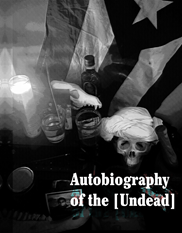
Modern writing is obsessed with the myth of originality. Supposedly, something cannot be good unless it makes a total break with the old, creating something finally “new.” The problem with this assumption is that nothing is ever really new. Even this observation I began with dates back to the book of Ecclesiastes, if not earlier. Not only is everything informed by that which came before, authors who refuse to admit their indebtedness aren’t innovators, but liars. It seems simultaneously compulsory and absurd to provide documentation for every single reference we make while writing. This is precisely the experiment in honesty that Emilio Carrero attempts in his hybrid book of poetry/memoir Autobiography of the [Undead]. Carrero cites not only other authors, but even conversations with friends, emails, diary entries, and more to weave a palimpsest of referentiality. The excessive attention to sources accomplishes many things simultaneously. It’s a brilliant critique of our cult of originality, since nothing is ever truly “original” (nor should we strive for that as an ideal). The sheer number of references (705 across 120 pages of text) makes it difficult for us readers to check every reference. After a point, we have to simply trust Carrero, something that is implicitly lost when we demand references in the first place. We’re forced to ask ourselves why we have such anxiety around proper attribution. What do we fear will be lost if words are “stolen” from others?
This last question stings many of us today in a world of AI and other blatant copyright infringement. It’s notable that this book and many others published by Calamari Archive are “copyleft,” or “All rites reversed” as the front material says. So long as their name is attached, anyone can use it for anything. This book’s very production questions the capitalistic roots of modern copyright law, walking the walk instead of merely talking the talk. Its formal considerations reinforce its theoretical and artistic aims, most of which revolve around the ethics of authorship. For example, text within the book is not only exceptionally reliant upon quotation, but the text regularly bears the mark of the author himself. Rather than the usual approach expected of authors, namely that they polish their writing so much that it hides all evidence of revision, Autobiography of the [Undead] draws attention to the scars of blackout and crossing-out, two species of erasure: one absolute, the other partial. Text is often bracketed, contingent, making explicit what the author is adding to the quotations to transform them from raw material into autobiography, a “mem-me” (memoir-of-me), as he coins it in the first poem. But even the term “poem” seems wrong to describe these entries, these chapters. The form varies from “typical” contemporary poetry to diary entries to emails to essays. Where they begin often is far from where they end, both in terms of form and content. Emails turning into essays and poems get caught, stripped of their wings, and chained to a litany of anaphora or a cluster of similar references.
One of the book’s most striking reclamations is an excerpt of Jacques Derrida’s “Signature Event Context” from his book Limited Inc. Infamous for its dense anti-aesthetic, a fragment of this theoretical text is “baptized” into the author’s personal mythology via strikethroughs of text and bracketed insertions. Though I was able to recognize the “original” Derridian reference, Carrero decidedly created something “new” here. But why do we care so much about which is the original and which is the new? In a way, Carrero’s entire book illustrates Derrida’s point about iterability, albeit in a clearer and more convincing way: repetition always modifies and mutates. Even rote repetition is displaced in time, meaning chronology itself is a force of change. Autobiography likewise is necessarily a backwards-looking genre, so Carrero uses the affordances of the genre to mull over (inter)personal events through the lens of ars poetica and defenses of poetry. The personal is not only political, but poetic.
Autobiography also operates with an underlying anxiety, anticipating “the radical absence of the sender” as Derrida might call it. Can it still communicate without them, when they are dead and buried, in the “[graveyard]” as Carrero puts it? In his [graveyard], Carrero’s mythology fills up his own grave, threatening to leave no room for him to enter when the time comes. But who is this “real” version of him who won’t fit? Also, doesn’t talk therapy teach us that self-mythologization is a reciprocal act, something that in turn shapes us and the way others see us? Autobiography ostensibly exists for the author to define their own story, rather than letting others define it. However, the heart wrenching poem “On Wanting” evokes Saint Paul’s wordy-albeit-relatable complaint that “I do not do what I want, but I do the very thing I hate.” Every time that Carrero repeats this it mutates its form, from sentence diagram to footnote to spatial poem. But if the author themselves isn’t fully in control, then what hope is there of ever capturing a “true” representation of the self or of one’s past? Rather than despairing, perhaps the book’s answer is to revel in the community of voices which have sustained us; instead of falling into individualism and solipsism, we might see the web of references surrounding us as a network, a support system, rather than a list of the dead that would bury us.
